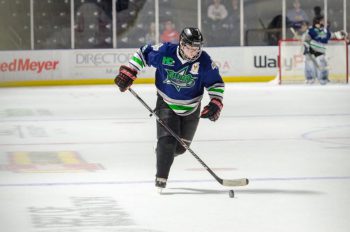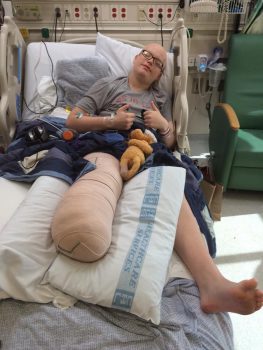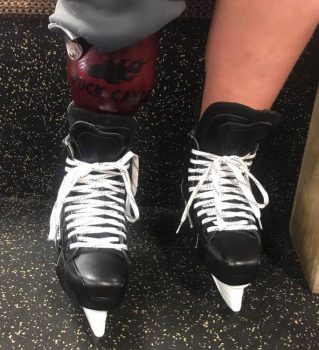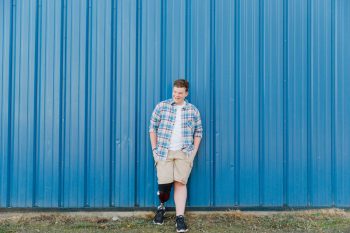
On May 18, 2016, Kara Chitwood and her son Bretton Chitwood traveled from their home in Lynden, Washington, to Seattle Children’s for what they thought would be a routine outpatient appointment to get magnetic resonance imaging (MRI) on Bretton’s ankle. Instead, they didn’t end up leaving the hospital. That day would become one they would never forget.
The pain Bretton was experiencing in his ankle was more insidious than they could have ever imagined. Doctors found a mass and said they needed to do a biopsy to determine what it was. One possibility was the unthinkable: cancer.
A broken bone, an unexpected diagnosis
Months earlier, Bretton had been longboarding to school when he fell and fractured his ankle in nine different places. Bretton was taken to a local emergency room close to their home, but the fracture was so severe he was transported to Seattle Children’s. After that initial visit, the family needed to travel to Seattle Children’s Mill Creek clinic for follow up appointments every three weeks. Bretton spent nearly six weeks in a wheelchair and months on crutches recovering.
Eventually, Bretton’s ankle healed and he got cleared to return to play ice hockey. The wait to get back to the sport he loved was agonizing. Before his accident, he played most days of the week on competitive teams.
“From day one, I’ve had a true love for the sport,” said Bretton.
Unfortunately, when he finally returned, he experienced lingering pain that kept him from playing to the best of his ability. They called Jeanette Kotch, a physician assistant and member of the Orthopedics and Sports Medicine team at Seattle Children’s, for her opinion. Over the past several months, Kotch had become like family. They saw her regularly at Seattle Children’s regional clinic.
“We thought it was a bone infection,” said Kara.
Kotch had a feeling something wasn’t right and ordered an MRI at Seattle Children’s the next day.

“I thought he would just need antibiotics and he would go home,” said Kara. “It was surreal. The unthinkable happened. We found out it was cancer.”
Bretton was diagnosed with osteosarcoma, an aggressive bone cancer.
“I heard the word cancer, but it went right over my head,” said Bretton. “I was in shock.”
Unfortunately, the news would only get more devastating. Because of the location of the tumor, Bretton would need to have his foot amputated.
“I thought my hockey career was over,” said Bretton. “I felt like the one thing I cared about more than anything was being taken away from me.”
“It is a huge shock to find out you have cancer,” said Dr. Katie Albert, a pediatric oncologist at Seattle Children’s. “And it’s even more difficult to hear the word amputation, but for some tumors, it is the ideal option for retaining the best function. We wanted Bretton to be able to continue to do the things he could do before his cancer diagnosis. Our goal is always the same: cure the disease and get these kids back to their lives.”
Seattle Children’s Bone Tumor and Sarcoma Clinic provides care for children, adolescents and young adults with bone tumors and soft tissue tumors.
“The clinic allows us to provide the best care to our patients in the most convenient way possible,” said Dr. Doug Hawkins, division chief of hematology and oncology at Seattle Children’s. “Caring for patients with sarcomas is different from other cancers. It requires a team of experts, from oncologists to surgeons to physical therapists and social workers. You want people who know a lot about rare cancers to bring their knowledge and resources together to create individualized care plans. That’s what we do.”
“We have the multidisciplinary expertise and resources,” added Albert. “This is the place you want to be.”
A new home

For the next 10 months, Seattle Children’s cancer unit became home. Bretton underwent 10 weeks of chemotherapy before having his foot amputated in August 2016. After that, he underwent another 20 weeks of chemotherapy.
He was in and out of the hospital a lot. He said the hardest part was being away from his friends and family and the sport he loved, but thanks to the tremendous support of his community, he said he never gave up or lost hope.
When he was finally able to get back to the hockey rink, he was overjoyed. His prosthesis, which reads ‘puck cancer,’ hasn’t slowed him down on the ice.
Getting back on the ice
For more than a year, Bretton has had no evidence of disease. He is back to playing hockey and will be starting college in the fall. He hopes his story will help inspire others.
When Bretton was first diagnosed with cancer he thought he’d never skate again. Thankfully, that wasn’t the case.
“These kids are with us for a year or more,” said Albert. “It’s a lot of time to be away from school, friends or activities. It’s a huge sacrifice, but we do it because we want them to have those moments later in life and never have to deal with this again.”
Today, Bretton’s mission is to share his love of hockey with others, and hopes to one day help bring a National Hockey team to Seattle. He said he dreams of being a season ticket holder.

“He is truly an inspiration and I can’t wait to see what the future holds for him,” said Kara.
To other kids fighting medical battles, Bretton offers words of encouragement. He knows how hard it is to be in a hospital and to feel like something has been taken away. Something hockey taught him was how to fight, and every day in the hospital he remembered that.
“It’s never over,” he said. “You always have to keep fighting. Today, more than ever, more and more kids are surviving. Don’t ever lose faith.”
Doctors and researchers at Seattle Children’s are working to improve treatments and outcomes for children with bone and soft tissue tumors, giving patients access to the latest options under investigation for their diagnosis.
A phase 1 clinical trial at Seattle Children’s is testing CAR T-cell immunotherapy in children and young adults with relapsed or refractory solid tumors. The trial is called STRIvE-01. In this trial, a patient’s own T cells are reprogrammed to recognize and target the protein EGFR, which is expressed by many childhood solid tumors, including sarcomas.
For more information visit T-Cell Immunotherapy for Solid Tumors (STRIvE).

